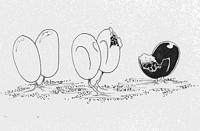|
 Leocarpus fragilis Leocarpus fragilis
SynonymsLycoperdon fragile
BiostatusPresent in region - Indigenous. Non endemic
Images (click to enlarge)
Caption: Sporangia of Leocarpus fragilis. The two at the centre are about 3 mm tall.
Owner: S.L. Stephenson |
Article: Stephenson, S.L. (2003). Myxomycetes of New Zealand. Fungi of New Zealand. Ngā Harore o Aotearoa 3: xiv + 238 p. Hong Kong: Fungal Diversity Press.
Description: Fruiting body a stalked or nearly sessile sporangium, gregarious or clustered, 2–4 mm tall. Sporotheca short-cylindrical to obovate to subglobose, 0.6–1.6 mm in diameter. Stalk weak, often flattened, pale yellow or ochraceous, essentially representing an extension of the hypothallus. Hypothallus membranous, pale ochraceous, contiguous for a group of sporangium, merging into the stalk. Peridium consisting of three layers, the outermost layer cartilaginous, smooth, shining, brittle, pale yellow to ochraceous to chestnut brown or deep maroon, the middle layer calcareous, and the inner layer membranous, hyaline. Capillitium of two types, the first consisting of a network of slender, colourless, flattened tubules usually expanded at the junctions, the second represented by a system of rigid, branching, white calcareous nodes, sometimes massed in the centre of the sporotheca as a pseudocolumella. Spores black in mass, brown by transmitted light, with a paler area at one side, coarsely warted, 12–14 µm in diameter. Plasmodium yellow.
Habitat: floor litter and wood debris; sometimes fruiting on living plants.
Distribution: Considered as cosmopolitan by Martin & Alexopoulos (1969) but most common in cool temperate regions of the world and essentially absent from the tropics (Farr 1976). First reported from New Zealand by Mitchell (1992), based on specimens collected in Auckland, Waikato, Buller, and Central Otago. Also known from Taupo, Nelson, and Fiordland.
|